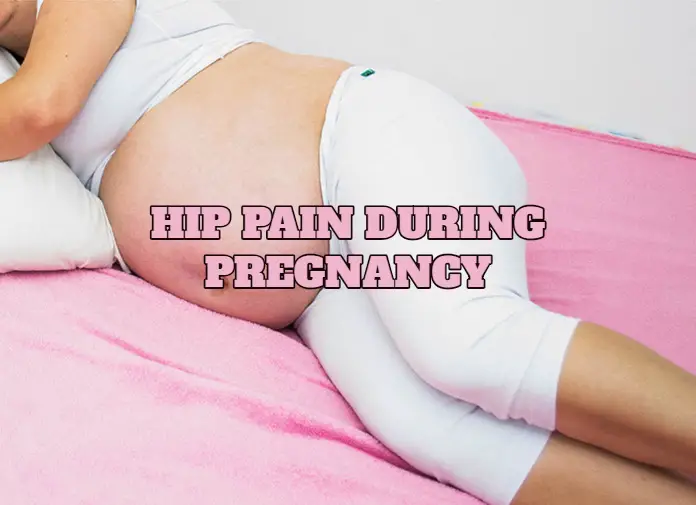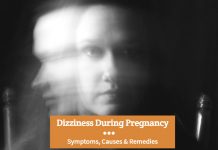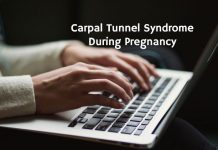Growing out your favorite jeans doesn’t seem a deal breaker when you are soon going to have your baby. But its the pelvis and hip pain during pregnancy won’t let you cherish the moments.
Pregnancy has a new challenge waiting for you every day. The pregnancy weight is not localized entirely around your tummy. Instead, your additional fat also deposits in your hip region, face and limbs.
Many causes lead to the painful hip symptom. The third-trimester hip pain is severe and may be a sign of preterm labor if accompanied with vaginal discharge and cramps.
Right hip pain or left hip pain depends on the side your uterus lies. Pain is more towards the region which has the uterus titled.
All the causes of hip pain during pregnancy are interrelated. Light exercise and simple precautions can alleviate the second-trimester pregnancy changes.

What causes hip pain while pregnant?
The reasons for pelvic pain during pregnancy are mainly because of weight gain and the influence of hormones. The second trimester will bring along lower back and hip pain. The body is now preparing for labor, and so the ligaments stretch and loosen.
10 Major causes of hip pain during pregnancy
1) Relaxin hormone
The hormone relaxin starts circulating in the blood and leads to loosening of the ligaments. Uterus grows and requires space to accommodate itself filled with fluids. The pelvic girdle is joined by the cartilage namely pubis symphysis. When the blood starts circulating the cartilage loosens and allows the pelvic girdle to broaden the gap. The womb lowers down as the due date of labor approaches and adjusts in the pelvic girdle. Stretching forces lead to sharp hip pain during pregnancy.
2) Round ligament pain
The round ligament faces a lot of strain as the uterus grows. Pain radiates to the surrounding areas including the pubis, abdomen and hips. When the baby moves faster or kicks, the pain is stronger. The stretching of the ligament around the abdomen area leads to unbearable pain all over.
3) Rapid weight gain
After the first half of the second trimester, the pregnant woman gains weight rapidly. The bones and muscles adjust to the load and strain. But it takes time and may never happen until the due date arrives. The pressure spreads to the back and leads to lower back and hip pain.
4) Unknowingly straining muscles
During pregnancy, careless movements can land you in soup. Standing for long or crossing legs while sitting can cause spasms. The stress applied on muscles of the lower body does not subside, and eventually, your back starts hurting, and you can’t bend. Groin pain during pregnancy is also because of the load above the region. Sore hips can lead to sleepless nights. Aggravating lower back hip pain while pregnant needs immediate medical attention.
5) Fluid accumulation and edema
Wearing restrictive and tight clothes impair blood circulation. Severe hip pain can happen if enough blood doesn’t reach the area. That is something which can happen to anyone, but a pregnant woman is more prone to it.
Hip and leg pain while pregnant is more probable due to excessive fat deposition in the area. Women anyway have more fat in the butt region. Hip muscle pain can happen because of tight clothes also. Some women have edema or swelling because of fluid accumulation during pregnancy.
6) Sciatica or nerve compression
A pair of sciatic nerves runs from your back up to your legs. As the vaginal pressure during pregnancy compresses the nerves, your hip region can become numb. Sciatica is a normal pregnancy complication and heals on its own. A particular position of the baby leads to more discomfort than others. A gentle massage can relieve sciatica pain in the hips.
7) Incorrect posture or sleeping position
If you experience hip pain during pregnancy at night, it may be because of sleeping on a side for long. Sleeping on your back during pregnancy is not a good practice. It is always recommended that you use extra padding and a pregnancy pillow while sleeping. Placing a warm wheat bag near your hips reduces the pain. While walking or sitting you must put equal weight on both legs and maintain an upright position.
8) Bone porosity
The lack of calcium in your blood is common during pregnancy. Your baby takes up calcium from your circulation. Pelvic pain while pregnant can be because of transient osteoporosis. Deficiency of calcium leads to bone resorption and weakening of bones. Pelvic bone pain during pregnancy is mostly because of relaxin and osteoporosis. A healthy diet with enough dairy products ensures a regular calcium supply.
9) Impending preterm labor
If not a symptom, hip pain can be a sign of probable premature delivery. Abdominal cramps along with radiating pain hints possibility of premature labor. Lower back pain towards the sides and pink or red discharge are indicators of preterm labor. Pain in left hip will not be solely in the protruding part but in the entire lower left the side of the body. When the baby is nestled towards the right side, it leads to pain in the right hip or vice versa.
10) Sudden jerk or vigorous activity
Getting up suddenly or running or any strenuous activity can lead to hip pain during pregnancy. Pain in the hip is problematic because neither sitting nor sleeping allows you to free the area of weight.
How can you treat hip pain during pregnancy?
Hip pain relief comes from doing yoga or giving yourself a massage. Sleeping in the correct position and using a pregnancy pillow goes a long way. Ways to treat hip pain pregnancy don’t require assistance. Dietary changes can cure hip bone pain. The causes of hip pain not only answer ‘why do my hips hurt’ but also give you possible treatment options.
Easy ways to alleviate hip pain pregnancy
1) Move yourself and your baby
Hip pain during pregnancy is because of the pressure applied by the growing uterus. The amniotic fluid increases as you move ahead in pregnancy. If you move after a period of inactivity, the fluids circulate and spread. Even for hip pain while sleeping, you can change posture to ensure movement. Baby movements reduce sciatica hip pain by allowing the nerves to relax as the weight shifts from one area to the another. Light and gentle exercises such as yoga and pilates cure back and hip pain will vanish and might not recur.
2) Use a pregnancy pillow and cushions
The outer hip pain is because of the weight pushing it down. Get a full-length pregnancy pillow for hip and lower back pain. Place extra cushions on the side that’s paining more. For instance, if you have pain in right hip then place cushions under it. Squeezing a pillow under your hips joint will alleviate sore hip. Using cushions prevents pain in hips.
How to sleep with hip pain? Place a cushion next to your baby bump to avoid toppling over your bump and lift your hips. Sharp pain in the hip can be cured by placing a wheat bag near it. The pillows and cushions you use counter the pelvic pressure during pregnancy.
3) Massage using a hot compress
Hip socket pain may be due to decreasing bone density. The bones and ligaments become sore because of the strain. Massaging using a warm compress will relieve you off the pain. Massaging also pushes the baby to move to the other side and reduces the load on the area. By second trimester your baby responds to stimuli.
Can you have hip pain during the first trimester? No, the first trimester is too early for any such pain which is because of pelvic pressure during pregnancy.
4) Always move gradually
When you walk quickly or bend down suddenly, you experience sharp hip pain. The round ligament can no longer retain its position or pull back other muscles. If your hip hurts or you experience sudden hip pain, you must stop and be still.
5) Sleep on your sides and change posture
The best sleeping position for hip pain is sleeping on sides. If your hip hurts while sleeping, change your position. Before getting up from your bed sit there or rise on your knees. Sleep in spacious and comfortable bedding. Do not put on any uncomfortable clothing that can block circulation.
6) Wear pregnancy belt and brace
Ask your doctor about wearing a pregnancy belt to help you manage the weight. Wear a supportive belt while you go for any physical activity or hip pain exercises.
7) Swimming and water exercises
Water exercises and swimming is good during later pregnancy. Pain in hip joint may not cure by swimming, and you need to consult about it with your OB. If your pregnancy hip pain is intense, your doctor may recommend bed rest. Swimming is good for back hip pain.
8) Take rest after a short period of work
Most of the times it is the duration of the work and not the kind of work that leads to pain. Hip pain exercises include stretches such as hamstring stretch or lifting your hips above the chest. Take breaks in between while doing exercise. Groin pain pregnancy spreads to the hip area when you stand for too long.
9) Wear comfortable footwear
High heels during pregnancy can cause restless legs. The pain can spread or leaf to hip and groin pain through nerve compression. Wear special footwear for hip and back pain. Early morning walking on grass helps alleviate hip pain.
10) Don’t cross your legs
When you have hip pain symptoms or even if you don’t, never sit with crossed legs. Crossed legs position puts hips out of place. For pregnant women, the posture does more harm due to pressure imbalance.
Painkillers such as Aspirin and Ibuprofen in combination are not safe during pregnancy. You must drink lots of fluids and take mineral supplements.
When to see your doctor for hip pain during pregnancy?
The pelvic pressure 37 weeks is one of the reasons that onset labor. If the front hip pain becomes unbearable, then you must talk to your doctor. Frequent contractions and vaginal discharge of pink or red color are abnormal.
While symptoms like hip and knee pain one side indicate that you’re overweight, sharp hip pain is a sign of preterm labor. Cramps and pubic bone pain pregnancy require you to consult with your gynecologist.









